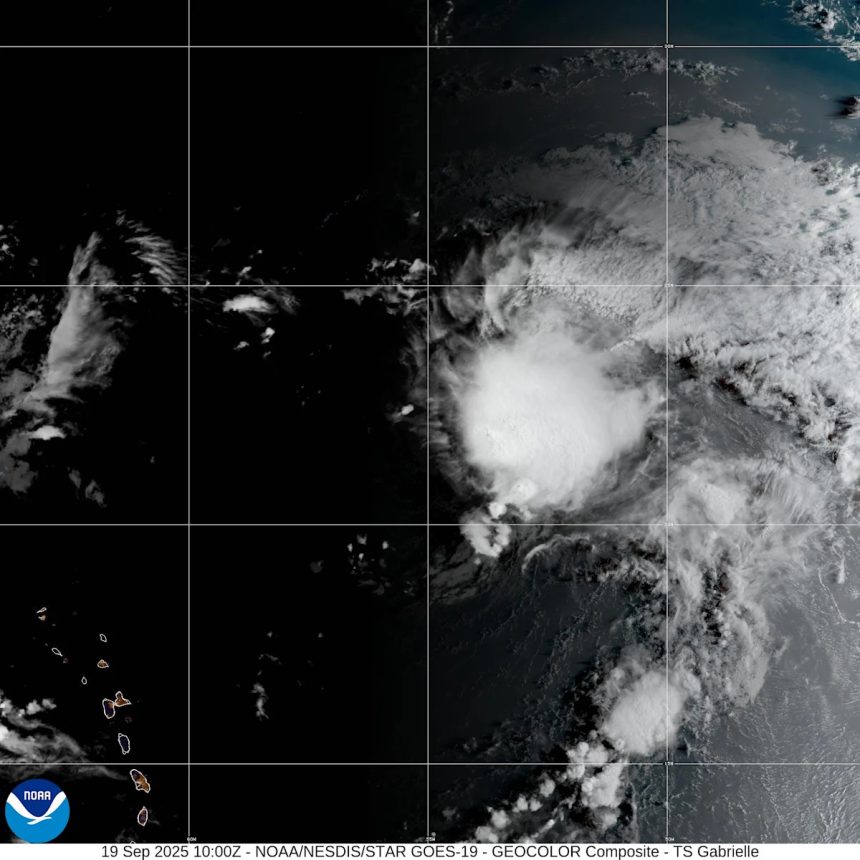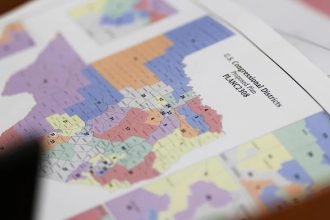The National Hurricane Center is tracking several systems in the Atlantic basin, including Tropical Storm Gabrielle, which is expected to become the season’s second hurricane over the weekend.
Tropical Storm Gabrielle formed in the central Atlantic Sept. 17, becoming the first named storm since Fernand in late August.
➤ Track all active storms, Tropical Storm Gabrielle
➤ Weather alerts via text: Sign up to get updates about current storms and weather events by location
Gabrielle is expected to become a hurricane Sunday, Sept. 21 as it passes east of Bermuda. Current forecasts predict it could become a Category 2 storm with maximum sustained winds of 105 mph.
If it does become a hurricane, it’ll be the second of the Atlantic hurricane season, following Erin, which became a hurricane in the central Atlantic on Aug. 15.
The National Hurricane Center is monitoring several tropical waves — including one in the Caribbean — and a tropical disturbance in the Atlantic with a low chance for development over the next seven days.
The next named storm of the season will be Humberto.
Here’s the latest advisory from the National Hurricane Center as of 5 a.m., Sept. 19:
Will Tropical Storm Gabrielle become a hurricane?
The National Hurricane Center said Tropical Storm Gabrielle is expected to become a hurricane Sunday, Sept. 21.
Current forecasts call for Gabrielle to strengthen into a Category 2 storm, with maximum sustained winds of 105 mph, within the next 96 hours.
Projected path of Tropical Storm Gabrielle as of 5 a.m. Sept. 19, 2025.
Will Tropical Storm Gabrielle impact South Carolina? See path
That’s unknown at this time, although current forecasts continue to predict Gabrielle will curve north in the Atlantic and stay away from South Carolina and the United States.
Gabrielle “isn’t the most picturesque tropical storm on satellite this afternoon by any stretch as it battles against dry and dusty air,” said Fox Weather meteorologist Ian Oliver via email Sept. 17.
“However, conditions will become increasingly favorable for intensification and Gabrielle is forecast to be a hurricane somewhere near or east of Bermuda early next week.”
“I think that if the storm is able to strengthen into a hurricane, which we currently have projected, we could see some beach issues next week, middle to end of next week, along the east coast. And that’s anywhere from Florida all the way up to New England,” according to Alex DaSilva, AccuWeather lead hurricane expert via email Sept. 17.
“That’s something we’re going to have to watch for. If the storm stays relatively weak, if it never gets to a hurricane, then we probably won’t have any beach hazards, but if it really intensifies north of the Caribbean and becomes a hurricane, we do have to be concerned for some rip current risks along the east coast next week.
“It could be a beautiful sunny day at the beach, but even if there’s a hurricane hundreds and hundreds of miles away, we can still see issues from rip currents,” DaSilva said.
Residents in Bermuda are advised to watch the system closely.
Spaghetti models for Tropical Storm Gabrielle
Special note about spaghetti models: Spaghetti model illustrations include an array of forecast tools and models, and not all are created equal. The Hurricane Center uses only the top four or five highest performing models to help make its forecasts.
What tropical waves, disturbances are in Atlantic basin now?
Tropical wave in eastern tropical Atlantic: A tropical wave just off the west coast of Africa is producing disorganized shower and thunderstorm activity.
Some slow development of this system is possible through the middle to latter part of next week while it moves west-northwestward across the eastern and central tropical Atlantic.
-
Formation chance through 48 hours: low, near 0 percent.
-
Formation chance through 7 days: low, 20 percent.
Tropical waves being monitored by National Hurricane Center:
A central Caribbean Sea tropical wave is near 74W from 22N southward from southwest Haiti to northeast Colombia, moving west at 17 to 23 mph. Scattered moderate convection is occurring over the Gulf of Gonave in Haiti, and inland over northeast Colombia.
An African easterly wave along the African coast near 18W from 21N southward, moving west near 17 mph. Scattered moderate to strong convection is along the coast of Senegal.
An eastern Atlantic tropical wave is near 34W from 22N southward, moving west around 17 to 23 mph. Isolated moderate convection is noted from 14N-16N between 32W-34W. is occurring across Hispaniola, Puerto Rico, the Virgin Islands and nearby waters.
Will Hurricane Gabrielle form in the Atlantic? Hurricane tracker
Hurricane season set to ramp up by late September
While the basin has been quiet — even through the climatological peak — officials warn that activity is likely to increase as suppressing factors like dry air and wind shear begin to fade.
Of particular concern are storms that form close to the United States. Unlike tropical waves that roll off Africa and give forecasters days to track, systems that develop in the Gulf, Caribbean or off the Southeast coast can catch residents with little time to prepare.
These “homegrown” storms can also rapidly intensify in the Gulf’s extremely warm waters, AccuWeather forecasters said.
Are any hurricanes coming to South Carolina?
No. Tropical Storm Gabrielle is the only named storm in the Atlantic currently.
Conditions can change rapidly, though, and forecasters warn residents to not become complacent and to always be prepared.
When does the Atlantic hurricane season end in South Carolina?
The Atlantic hurricane season runs from June 1 through Nov. 30.
Ninety-seven percent of tropical cyclone activity occurs during this time period, NOAA said.
The Atlantic basin includes the northern Atlantic Ocean, Caribbean Sea and Gulf of America, as the Gulf of Mexico is now known in the U.S. per an order from President Donald Trump. NOAA and the National Hurricane Center are now using Gulf of America on its maps and in its advisories.
The peak of the season is Sept. 10, with the most activity happening between mid-August and mid-October, according to the Hurricane Center.
Prepare now for hurricanes
Delaying potentially life-saving preparations could mean waiting until it’s too late. “Get your disaster supplies while the shelves are still stocked, and get that insurance checkup early, as flood insurance requires a 30-day waiting period,” NOAA recommends.
-
Develop an evacuation plan: If you are at risk from hurricanes, you need an evacuation plan. Now is the time to begin planning where you would go and how you would get there.
-
Assemble disaster supplies: Whether you’re evacuating or sheltering-in-place, you’re going to need supplies not just to get through the storm but for the potentially lengthy aftermath, NOAA said.
-
Get an insurance checkup and document your possessions: Contact your insurance company or agent now and ask for an insurance check-up to make sure you have enough insurance to repair or even replace your home and/or belongings. Remember, home and renters insurance doesn’t cover flooding, so you’ll need a separate policy for it. Flood insurance is available through your company, agent, or the National Flood Insurance Program. Act now, as flood insurance requires a 30-day waiting period.
-
Create a family communication plan: NOAA says to take the time now to write down your hurricane plan and share it with your family. Determine family meeting places, and make sure to include an out-of-town location in case of evacuation.
-
Strengthen your home: Now is the time to improve your home’s ability to withstand hurricane impacts. Trim trees; install storm shutters, accordion shutters, and/or impact glass; seal outside wall openings.
South Carolina weather radar

South Carolina weather watches and warnings
Interactive map: Hurricanes, tropical storms that have passed near your city
Stay informed. Get weather alerts via text
Brandi D. Addison covers weather across the United States as the Weather Connect Reporter for the USA TODAY Network. She can be reached at baddison@gannett.com.
This article originally appeared on Greenville News: Will Tropical Storm Gabrielle become a hurricane? See SC impacts









